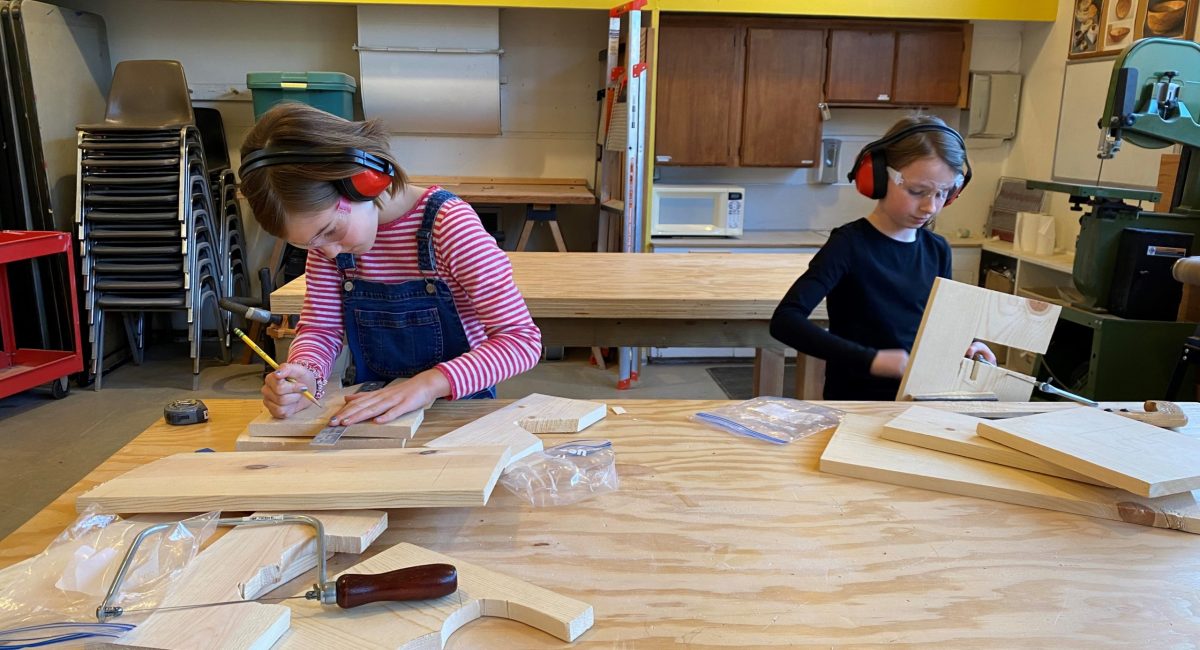woodworking classes near me is more than just a hobby; it’s an art form that allows individuals to express their creativity while honing practical skills. If you’ve ever found yourself admiring handcrafted furniture or intricate wooden designs, you might have thought about diving into the world of woodworking. The good news is that there are woodworking classes near you that can help you get started on this rewarding journey. In this article, we will explore the benefits of woodworking, what to expect from classes, and how to find the right one for you.
The Allure of Woodworking
Woodworking has been a cherished craft for centuries, and its allure continues to captivate people of all ages. The tactile experience of working with wood, the smell of fresh sawdust, and the satisfaction of creating something with your own hands are just a few reasons why woodworking is so appealing. Whether you’re looking to build furniture, create decorative items, or simply enjoy a new hobby, woodworking offers endless possibilities.
One of the most significant benefits of woodworking is the sense of accomplishment it brings. There’s something incredibly fulfilling about transforming a raw piece of wood into a beautiful and functional item. This process not only boosts your confidence but also enhances your problem-solving skills as you navigate the challenges of design and construction. Plus, woodworking can be a great way to relieve stress and unwind after a long day.
In addition to personal satisfaction, woodworking can also foster a sense of community. Many woodworking classes near you will connect you with like-minded individuals who share your passion for the craft. This camaraderie can lead to lasting friendships and a supportive network of fellow woodworkers who can offer advice, share tips, and inspire each other.
What to Expect from Woodworking Classes
When you decide to enroll in woodworking classes near you, you can expect a structured learning environment that caters to both beginners and more experienced woodworkers. Most classes will cover essential skills such as measuring, cutting, sanding, and finishing wood. You’ll also learn about different types of wood, tools, and techniques that are fundamental to the craft.
Classes typically begin with an introduction to safety protocols, as working with tools and machinery can pose risks if not handled properly. Instructors will emphasize the importance of using personal protective equipment (PPE) and following safety guidelines to ensure a safe learning experience. This foundational knowledge is crucial for anyone looking to pursue woodworking seriously.
As you progress through the classes, you’ll have the opportunity to work on various projects that will challenge your skills and creativity. From simple items like birdhouses and picture frames to more complex furniture pieces, each project will help you build confidence and competence. Instructors will provide guidance and feedback, allowing you to refine your techniques and develop your unique style.
Finding Woodworking Classes Near You
With the growing popularity of woodworking, finding classes near you has never been easier. A quick online search for “woodworking classes near me” will yield a plethora of options, from community colleges and adult education centers to local woodworking shops and studios. Many of these establishments offer a range of classes tailored to different skill levels, so you can find the perfect fit for your needs.
When searching for woodworking classes, consider factors such as location, class size, and instructor experience. Smaller classes often provide more personalized attention, allowing you to receive hands-on guidance as you learn. Additionally, look for instructors who have a strong background in woodworking and a passion for teaching. Their expertise can make a significant difference in your learning experience.
Another great way to find woodworking classes is by checking local community boards, social media groups, and woodworking forums. These platforms often feature announcements for upcoming classes and workshops, as well as recommendations from fellow woodworkers. Don’t hesitate to reach out to local woodworking clubs or organizations, as they may offer classes or know of reputable instructors in your area.
The Benefits of Learning Woodworking
Enrolling in woodworking classes near you comes with a host of benefits that extend beyond just learning how to work with wood. For starters, woodworking can significantly enhance your fine motor skills and hand-eye coordination. As you learn to manipulate tools and materials, you’ll develop greater dexterity and precision, which can translate to improved skills in other areas of your life.
Moreover, woodworking encourages critical thinking and creativity. Each project presents unique challenges that require you to think outside the box and come up with innovative solutions. Whether you’re designing a piece from scratch or troubleshooting a problem during construction, you’ll find that woodworking fosters a mindset of resourcefulness and adaptability.
Additionally, woodworking can be a fantastic way to disconnect from the digital world and engage in a hands-on activity. In our fast-paced, technology-driven society, taking the time to work with your hands can be incredibly grounding. It allows you to focus on the present moment, providing a sense of mindfulness that can be hard to find elsewhere.
Choosing the Right Class for You
With so many woodworking classes available, it can be overwhelming to choose the right one for your needs. Start by assessing your skill level and what you hope to achieve through the class. If you’re a complete beginner, look for introductory courses that cover the basics of woodworking. These classes will provide you with a solid foundation and help you build confidence as you progress.
If you have some experience under your belt, consider classes that focus on specific techniques or projects that interest you. For example, if you’re passionate about furniture making, seek out classes that specialize in that area. This targeted approach will allow you to deepen your knowledge and refine your skills in a particular aspect of woodworking.
Another important factor to consider is the class format. Some people thrive in a traditional classroom setting, while others prefer a more hands-on, workshop-style experience. Determine what type of learning environment suits you best and seek out classes that align with your preferences. Many woodworking schools also offer online classes, which can be a convenient option if you have a busy schedule.
The Role of Community in Woodworking
One of the most rewarding aspects of woodworking is the sense of community it fosters. When you enroll in woodworking classes near you, you’ll likely meet fellow enthusiasts who share your passion for the craft. This camaraderie can lead to lasting friendships and a supportive network of individuals who can offer advice, share tips, and inspire each other.
Many woodworking classes also encourage collaboration and group projects, allowing you to learn from one another and exchange ideas. This collaborative spirit can enhance your learning experience and expose you to different techniques and perspectives. Plus, working alongside others can make the process more enjoyable and motivate you to push your boundaries.
In addition to classes, consider joining local woodworking clubs or organizations. These groups often host events, workshops, and competitions that provide opportunities for networking and skill development. Engaging with the woodworking community can help you stay motivated and inspired as you continue your journey in this rewarding craft.
The Importance of Safety in Woodworking
As you embark on your woodworking journey, it’s essential to prioritize safety. Working with tools and machinery can pose risks, so understanding and following safety protocols is crucial. Most woodworking classes will begin with a thorough introduction to safety measures, including the proper use of personal protective equipment (PPE) and safe tool handling practices.
Familiarize yourself with the tools you’ll be using, and don’t hesitate to ask your instructor for clarification if you’re unsure about something. It’s better to take the time to learn the correct techniques than to rush and risk injury. Additionally, always keep your workspace organized and free of clutter to minimize hazards.
As you gain more experience, you’ll develop a better understanding of safe practices and how to assess potential risks. This knowledge will not only keep you safe while woodworking but also instill confidence in your abilities as you tackle more complex projects.
Exploring Different Woodworking Techniques
Woodworking is a diverse craft that encompasses a wide range of techniques and styles. As you take classes and gain experience, you’ll have the opportunity to explore various methods that can enhance your skills and broaden your creative horizons. Some popular woodworking techniques include joinery, carving, and finishing.
Joinery is the process of connecting two pieces of wood together, and there are numerous methods to achieve this, such as dovetail joints, mortise and tenon joints, and pocket hole joinery. Each technique has its unique advantages and applications, so experimenting with different joinery methods can help you find your preferred style.
Carving is another fascinating aspect of woodworking that allows you to add intricate details and designs to your projects. Whether you’re interested in relief carving, whittling, or chip carving, there are classes available that focus specifically on these techniques. Carving can be a meditative practice, allowing you to express your creativity while honing your skills.
Finishing is the final step in the woodworking process and plays a crucial role in the overall appearance and durability of your projects. Learning about different finishing techniques, such as staining, painting, and applying clear coats, can elevate your work and give it a professional touch. Many woodworking classes will cover finishing techniques, so be sure to pay attention to this important aspect of the craft.
The Joy of Creating Functional Art
One of the most rewarding aspects of woodworking is the ability to create functional art. Unlike many other crafts, woodworking allows you to produce items that are not only beautiful but also serve a practical purpose. From handcrafted furniture to decorative home accents, the possibilities are endless.
As you progress in your woodworking journey, you’ll find that your projects can reflect your personal style and taste. Whether you prefer a rustic, traditional look or a sleek, modern aesthetic, woodworking allows you to express yourself through your creations. This sense of individuality can make your work even more meaningful and fulfilling.
Moreover, creating functional art can also be a wonderful way to share your passion with others. Handmade gifts, such as custom cutting boards or unique picture frames, can be cherished by friends and family, adding a personal touch to any occasion. The joy of giving a handcrafted item is unparalleled, and it can inspire others to appreciate the beauty of woodworking.
Continuing Your Woodworking Education
Once you’ve completed your initial woodworking classes, you may find yourself eager to continue learning and expanding your skills. Fortunately, there are countless resources available to help you on your journey. Online tutorials, woodworking books, and instructional videos can provide valuable insights and techniques that you can incorporate into your projects.
Additionally, consider attending workshops or advanced classes that focus on specific areas of woodworking that interest you. Many woodworking schools and studios offer specialized courses that delve deeper into topics such as furniture design, cabinetry, or woodturning. These advanced classes can help you refine your skills and take your woodworking to the next level.
Networking with other woodworkers can also be a great way to continue your education. Joining local woodworking clubs or online forums can expose you to new ideas, techniques, and resources. Engaging with the woodworking community can keep you motivated and inspired as you explore the endless possibilities of this craft.
The Future of Woodworking
As you embark on your woodworking journey, it’s essential to consider the future of the craft. With the rise of technology and digital fabrication, woodworking is evolving in exciting ways. Many woodworkers are now incorporating CNC machines, laser cutters, and 3D printing into their projects, allowing for greater precision and creativity.
However, traditional woodworking skills remain invaluable. The ability to work with your hands and understand the properties of wood will always be essential, regardless of technological advancements. As you continue to learn and grow in your woodworking journey, embrace both the traditional and modern aspects of the craft.
Moreover, sustainability is becoming increasingly important in woodworking. Many woodworkers are now prioritizing the use of reclaimed or sustainably sourced materials, reducing their environmental impact while creating beautiful pieces. As you explore woodworking classes near you, consider seeking out instructors who emphasize sustainable practices and responsible sourcing.
Conclusion: Your Woodworking Adventure Awaits
Embarking on a woodworking journey is an exciting and fulfilling endeavor. With the right classes and resources, you can develop your skills, connect with a supportive community, and create beautiful, functional pieces that reflect your unique style. Whether you’re a complete beginner or looking to refine your techniques, there are woodworking classes near you that can help you achieve your goals.
So, take the plunge and explore the world of woodworking. Your adventure awaits, and who knows? You might just discover a lifelong passion that brings you joy and satisfaction for years to come. Happy woodworking!




